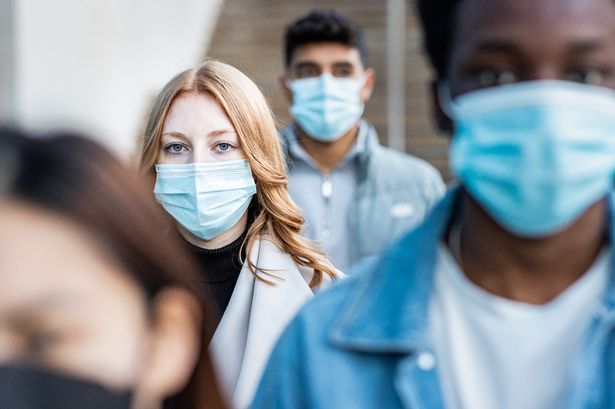Health
Swiss Experts Urge Mask Wearing as Covid Cases Rise Again

As Covid-19 cases continue to increase, Swiss health experts are recommending that certain individuals resume wearing face masks. This guidance comes as the winter season approaches and follows a significant uptick in infections, particularly in the UK. Since the pandemic officially concluded three years ago, such recommendations mark a notable shift in public health advice.
Swiss immunologists are advocating for mask use primarily among vulnerable populations, including the elderly and those with compromised immune systems. They assert that wearing masks can effectively reduce the transmission of viruses like Covid-19. While the focus is on protecting those at higher risk, the experts also encourage individuals who are not considered vulnerable to consider wearing a mask as a preventive measure.
In the UK, the Health and Security Agency (UKHSA) reported a substantial rise in Covid cases. As of October 3, 2023, the number of confirmed cases has been on the rise, with notable increases observed since September. For instance, in the week leading up to September 24, the country recorded 2,459 new cases, marking a 7.6 percent increase compared to the previous week. This surge is largely attributed to the emergence of the new Stratus strain of the virus, which includes two variants, XFG and XFG.3.
Tanja Stadler, an epidemiologist at ETH Zurich and chair of the Swiss Confederation’s Covid scientific task force, emphasized the importance of mask-wearing in crowded, enclosed spaces. She stated, “In crowded, enclosed spaces, such as public transportation, it’s advisable for vulnerable people—those over 65 or those with compromised immune systems. Even those who aren’t vulnerable can protect themselves from troublesome infections and, at the same time, show solidarity with others.”
Stadler clarified that she is not advocating for a return to mandatory mask mandates like those enforced during the pandemic’s height. Instead, she believes that authorities should implement a virus bulletin to inform the public about potential hotspots. She pointed out that while data on virus spread is available, it is not easily accessible to the general public. “Making it available would help those who want to protect themselves act accordingly,” she added.
Similarly, Marcel Tanner, a professor emeritus of public health at the University of Basel and a former member of the Covid Task Force, suggested that anyone displaying cold-like symptoms should wear a mask, particularly in public transportation settings. This recommendation reflects a growing understanding that proactive measures can mitigate the spread of respiratory viruses.
The UK is currently navigating the complexities of the new variants. According to data from the UKHSA, the XFG variant is associated with symptoms such as a significantly hoarse voice, alongside typical signs like fever and fatigue. Nevertheless, health officials assert that there is no evidence to suggest that these variants are more lethal than previous strains. Dr. Allen from the UKHSA stated, “Based on the available information so far, there is no evidence to suggest that the XFG and XFG.3 variants cause more severe disease than previous variants, or that the vaccines in current use will be less effective against them.”
In a related note, the World Health Organization has classified the XFG strain as posing a “low risk” globally. The WHO noted that while XFG is spreading rapidly compared to other circulating variants, it exhibits only marginal additional immune evasion. The organization also acknowledged increases in cases and hospitalizations in some Southeast Asian countries, where the XFG variant is prevalent, but emphasized that no heightened disease severity has been reported compared to other circulating variants.
As public health experts continue to monitor the evolving situation, the emphasis on individual responsibility and proactive health measures remains paramount. The recommendations for mask-wearing, particularly in high-risk settings, serve as a reminder of the ongoing challenges posed by respiratory viruses and the importance of protecting vulnerable populations as winter approaches.
-

 Health3 months ago
Health3 months agoNeurologist Warns Excessive Use of Supplements Can Harm Brain
-

 Health3 months ago
Health3 months agoFiona Phillips’ Husband Shares Heartfelt Update on Her Alzheimer’s Journey
-

 Science1 month ago
Science1 month agoBrian Cox Addresses Claims of Alien Probe in 3I/ATLAS Discovery
-

 Science1 month ago
Science1 month agoNASA Investigates Unusual Comet 3I/ATLAS; New Findings Emerge
-

 Science4 weeks ago
Science4 weeks agoScientists Examine 3I/ATLAS: Alien Artifact or Cosmic Oddity?
-

 Entertainment4 months ago
Entertainment4 months agoKerry Katona Discusses Future Baby Plans and Brian McFadden’s Wedding
-

 Science4 weeks ago
Science4 weeks agoNASA Investigates Speedy Object 3I/ATLAS, Sparking Speculation
-

 Entertainment4 months ago
Entertainment4 months agoEmmerdale Faces Tension as Dylan and April’s Lives Hang in the Balance
-

 World3 months ago
World3 months agoCole Palmer’s Cryptic Message to Kobbie Mainoo Following Loan Talks
-

 Science4 weeks ago
Science4 weeks agoNASA Scientists Explore Origins of 3I/ATLAS, a Fast-Moving Visitor
-

 Entertainment4 months ago
Entertainment4 months agoLove Island Star Toni Laite’s Mother Expresses Disappointment Over Coupling Decision
-

 Entertainment3 months ago
Entertainment3 months agoMajor Cast Changes at Coronation Street: Exits and Returns in 2025









